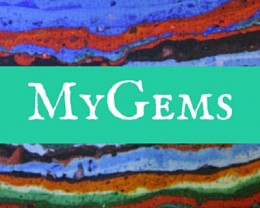21Grams Al Haggounia 001 Enstatite EL3 Melt -Rock Meteorite
- UGS
- BE 802
- Dimensions (mm)
- 45 x 22 x 20mm
- Poids (cts)
- 1
- Couleurs
-
Al Haggounia 001
The meteorite hit Al Haggounia, in Morocco and spread over 40 Kilometres and estimated to be 20,000 years old and weathered.
The outer surface is rusty brown due to severe alteration. Looks like a sedimentary breccia cemented by iron oxide and carbonate.
Color changes from bluish grey to rusty brown closest to the fractures are observed. Yellow patches of Sulphur (alteration) are widespread.
The rocks are significantly porous with pore sizes from several cm to hundreds of microns.
The specimen is non magnetic.
The Aubrite class of achondrite meteorites, comprised mostly of the mineral Enstatite share a close kinship with the class of meteorites named after the same mineral, the ̈Enstatite ̈ or ̈E ̈ Chondrite. While they’re both comprised of the same mineral, they don’t appear to originate from the same parent bodies. It is thought however that the Aubrites, tending to be highly reduced igneous breccias of enstatite and plagioclase, could likely be mimicked by a sufficiently altered enstatite chondrite.
Such was the case for Al Haggounia 001. When the meteorite was first analyzed with a limited sampling, it was thought to be an Aubrite. It was only a larger sampling of material examined over many years which allowed scientists to piece together Al Haggounia 001’s actual classification. It is now widely accepted, though vastly under reported, that Al Haggounia is better classified as an ancient EL3 Enstatite that has been through extensive secondary terrestrial processing. Al Haggounia
001 and its pairings are in effect ̈paleo ̈ meteorites thought to have landed on Earth near the end of the Pleistocene epoch, over 20,000 years ago. This controversial meteorite has undergone so much secondary terrestrial processing that it is not uncommon to find large xenolithic terrestrial clasts that have been incorporated into the meteorite often resembling a mixed metamorphic breccia.
We visited Morocco in 2017 and visited areas where meteorites were found, but they were extremely difficult to find. In several hours we only found one small meteorite. Two images enclosed when we went fossicking for meteorites.
Please copy and paste link to view our trip and recommend you add to your bucket list fossil tours!
https://www.gemrockauctions.com/learn/did-you-know/fossil-safari-dinosaurs-and-fossil-hunting-in-morocco
| Fournisseur d'expédition | Expédition vers Australie | Expédition dans le reste du monde | Expédition combinée ( Australie ) | Expédition combinée (reste du monde) |
|---|---|---|---|---|
| Express Shipping |
|
|
|
|
| Registered Shipping |
|
|
|
|
- UGS
- BE 802
- Dimensions (mm)
- 45 x 22 x 20 mm
- Poids (cts)
- 1
- Couleurs
-
Al Haggounia 001
The meteorite hit Al Haggounia, in Morocco and spread over 40 Kilometres and estimated to be 20,000 years old and weathered.
The outer surface is rusty brown due to severe alteration. Looks like a sedimentary breccia cemented by iron oxide and carbonate.
Color changes from bluish grey to rusty brown closest to the fractures are observed. Yellow patches of Sulphur (alteration) are widespread.
The rocks are significantly porous with pore sizes from several cm to hundreds of microns.
The specimen is non magnetic.
The Aubrite class of achondrite meteorites, comprised mostly of the mineral Enstatite share a close kinship with the class of meteorites named after the same mineral, the ̈Enstatite ̈ or ̈E ̈ Chondrite. While they’re both comprised of the same mineral, they don’t appear to originate from the same parent bodies. It is thought however that the Aubrites, tending to be highly reduced igneous breccias of enstatite and plagioclase, could likely be mimicked by a sufficiently altered enstatite chondrite.
Such was the case for Al Haggounia 001. When the meteorite was first analyzed with a limited sampling, it was thought to be an Aubrite. It was only a larger sampling of material examined over many years which allowed scientists to piece together Al Haggounia 001’s actual classification. It is now widely accepted, though vastly under reported, that Al Haggounia is better classified as an ancient EL3 Enstatite that has been through extensive secondary terrestrial processing. Al Haggounia
001 and its pairings are in effect ̈paleo ̈ meteorites thought to have landed on Earth near the end of the Pleistocene epoch, over 20,000 years ago. This controversial meteorite has undergone so much secondary terrestrial processing that it is not uncommon to find large xenolithic terrestrial clasts that have been incorporated into the meteorite often resembling a mixed metamorphic breccia.
We visited Morocco in 2017 and visited areas where meteorites were found, but they were extremely difficult to find. In several hours we only found one small meteorite. Two images enclosed when we went fossicking for meteorites.
Please copy and paste link to view our trip and recommend you add to your bucket list fossil tours!
https://www.gemrockauctions.com/learn/did-you-know/fossil-safari-dinosaurs-and-fossil-hunting-in-morocco
| Fournisseur d'expédition | Expédition vers Australie | Expédition dans le reste du monde | Expédition combinée ( Australie ) | Expédition combinée (reste du monde) |
|---|---|---|---|---|
| Express Shipping |
|
|
|
|
| Registered Shipping |
|
|
|
|

-
 Positif
PositifAwesome quality, lightning quick delivery and great value! Thank you so much! I will definitely be buying from you soon!
-
 Positif
PositifNice thanks
-
 Positif
PositifNice thanks
-
 Positif
PositifLove it! Super quick shipping. Would definitely purchase again from seller. Thank you!
-
 Positif
PositifStunning little piece. Absolutely love. Shipping was super fast too. Thanks!














